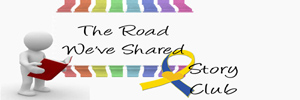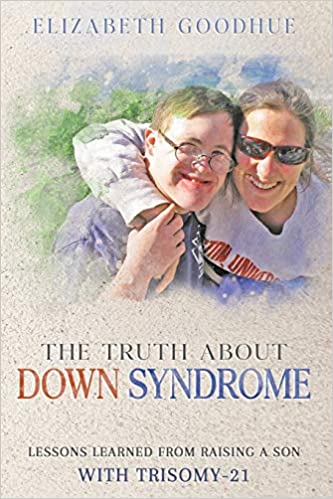Elizabeth Goodhue
In this book, Elizabeth traces her journey beyond the maze of social, governmental, medical, and school bureaucracies that accompany people with disabilities. Her mission has always been to bust the stereotypes people create, not just around Trisomy-21 (Down syndrome) but around anyone with a difference. As you meet William in these pages, you see he is just like everyone else except that he has an extra chromosome. And Elizabeth, though facing unique challenges, is like every other mother devoted to raising a healthy child and seeing him into adulthood.
Told in vignettes and bits of poetry, Elizabeth Goodhue's memoir of raising a son with Trisomy-21 is an engaging, deeply human read. Each vignette is short–so you think, "Oh, I'll read 10, then put it down." But—you read 10, then "just one more"—before you know it, you've read one-third of the book in one sitting.
Though an obvious audience is parents or prospective parents of children with Trisomy-21, the audience is much broader: parents wanting to learn about advocating for their children, parents interested in a mother's parenting journey, people interested in meeting the needs and recognizing the humanity of people with disabilities, people interested in others' growth, and development in relationships.
Most importantly, educators should read this book: teachers, school staff, principals, district administrators, school superintendents—all these people, especially those tasked with determining the "individual education plans" for students with disabilities — must read this book and learn how to listen, see strengths, and genuinely support students with differences.
Phil Rosenkrantz on Goodreads wrote:This book is a reflection of the author's personal growth, joy and frustration in raising her first child who has Down syndrome. There is beauty here, in the pauses she takes to write poetry about what she feels in moments where William makes her stop and see the world from his perspective. There is also frustration with institutions that insist on cramming William, the square peg, into an obtusely round hole. Courage plays a role, in the amniocentesis that leads to a miscarriage, and the ability to have more children after William, despite the fear that they, too, might have Down Syndrome.
About 1 out of every 700 births involve a baby with Down Syndrome, and as of 2008, there were over 250,000 people living with Down Syndrome. As this book aptly illustrates, they are all different people. The struggles that parents have now haven't changed: there are still widespread misconceptions about what it means, and that they are all the same kind of person. Goodhue addresses this poignantly, describing how other children with Down Syndrome are doing things that William will never be able to do.
A mother who has a child with different abilities other than Down Syndrome, will also find this book a valuable resource in identifying help in emotionally coping with the ups and downs of raising different children, and in navigating the often complex social and governmental agencies with which the children and their parents have to deal.
My daughter, Debi, has Trisomy-21 and is the same age as Willam, so this book caught my attention. She vividly tells the raw truth about the challenges, small victories, but great rewards on the journey. One big point is that our children may have some things in common, but they are unique, special, and inspiring. Many great and helpful insights for all of us.





Leave a Reply